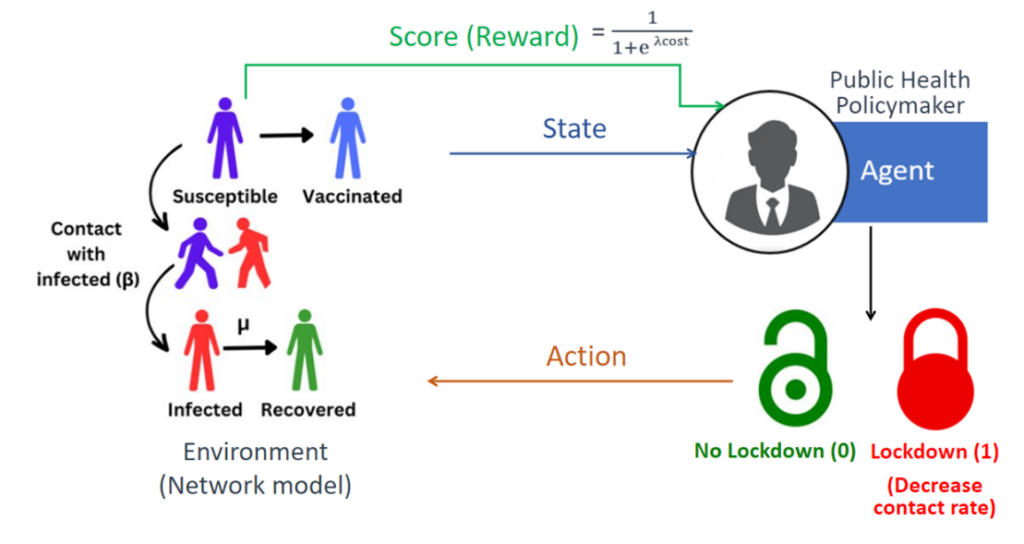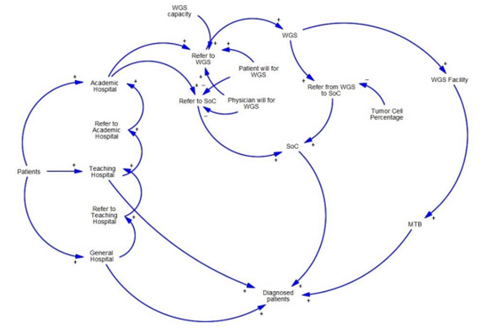Our lab is dedicated to pioneering cutting-edge modeling and optimization techniques to empower decision-makers across diverse domains, with a particular emphasis on healthcare and crisis management. We are committed to harnessing the power of mathematical and computational methodologies to address complex challenges, such as resource allocation in healthcare systems and crisis response strategies. Through our research, we strive to develop innovative solutions that facilitate informed decision-making, ultimately improving the efficiency, effectiveness, and resilience of systems in these critical areas.
Overview: Epidemics pose significant threats to public health and the economy. In this project, we focus on enabling local authorities to make informed decisions regarding epidemic control measures, specifically lockdown policies. We employ reinforcement learning to optimize the decision-making process of local authorities, aiming to minimize the cumulative cost of epidemic outbreaks.
Methodology: To simulate real-world epidemics, we model a network of individuals, with each node representing an individual. Reinforcement learning is utilized to determine the optimal timing and extent of lockdown measures, providing authorities with a data-driven approach to epidemic control.
Expected Outcomes: Our research aims to identify optimal actions for local authorities in epidemic scenarios, serving as a foundation for evidence-based lockdown policies. These findings may prove invaluable in mitigating the impact of epidemic outbreaks on public health and the economy.

Figure: Schematic Illustration of Reinforcement Learning in Epidemic Control
Overview: The phenomenon of panic buying in supply chains has become increasingly relevant, especially during times of crisis and uncertainty. This project introduces a novel approach to comprehending and mitigating panic buying behavior using an agent-based simulation within a game-theoretic decision-making framework. Our research aims to provide a comprehensive understanding of panic buying dynamics and offer valuable insights for supply chain stakeholders.
Methodology: Our agent-based simulation model captures interactions between customers, suppliers, and retailers, modeling intricate decision-making processes and information flows within the supply chain. We utilize game theory to analyze how customers strategically adapt their purchasing behaviors under various scenarios.
Expected Outcomes: This project seeks to enhance our understanding of panic buying in supply chains and inform supply chain managers, policymakers, and retailers on strategies to mitigate its negative effects. By simulating and analyzing panic buying behaviors, we aim to guide the development of more resilient supply chain strategies, crisis management protocols, and pricing mechanisms.
Overview: Cancer treatment involves various challenges, including timely diagnoses and cost considerations. This project focuses on the implementation of Whole Genome Sequencing (WGS) as a diagnostic tool for lung cancer patients. We explore the optimal strategies for hospitals in referring patients for WGS testing and leverage agent-based simulation and game theory for evaluation.
Methodology: Our approach involves simulating the diagnostic process using agent-based simulation, allowing hospitals to develop their referral policies. We employ a game theoretic framework to optimize hospital choices regarding the use of WGS testing, aiming to minimize patient waiting times and costs.
Expected Outcomes: This project aims to establish optimal diagnostic strategies for hospitals and improve the timing of WGS testing, ultimately benefiting lung cancer patients. By combining agent-based simulation and game theory, we seek to enhance the efficiency of diagnostic processes and reduce the economic burden on patients.

Figure: Causal Loop Diagram of WGS Referral Process

Dr. Marzieh Soltanolkottabi
Assistant professor / Industrial and Systems Engineering
Msoltan@newhaven.edu

Dr. Narjes Sadeghiamirshahidi
Assistant professor / Industrial and Systems Engineering
Nsadeghi@newhaven.edu

Merishna Singh Suwal
Research Assistant / MS in Data Science

Fateme (Hasti) Ghalenoei
Research Assistant / MS in Industrial Engineering